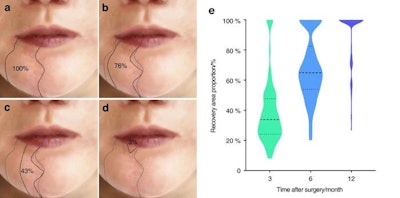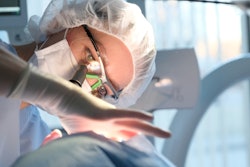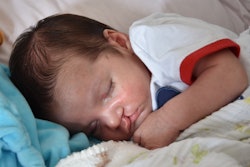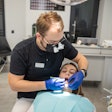
The loss of sensation in the lower lip caused by damage to the inferior alveolar nerve during mandibulectomy may no longer be irreversible, according to researchers from West China Hospital of Sichuan University in Chengdu, China.
The findings offer patients who have undergone mandibulectomy hope for improved quality of life, wrote a team led by PhD candidate Pingchuan Ma. Ma and colleagues published their research on June 8 in the International Journal of Oral Science.
The team conducted an animal model study that explored the mechanisms of sensory recovery post-mandibulectomy using a "mental nerve transection model in Thy1-YFP mice and employed tissue clearing techniques to observe the changes in peripheral nerves."
The study showed that 75% of patients who had unilateral inferior alveolar nerve damage after mandibulectomy experienced nearly complete pain sensation sensory recovery of the lower lip within one year after surgery. Factors that influenced their recovery included being of a younger age, the preservation of the ipsilateral buccal and lingual nerves, and, surprisingly, the presence of malignant tumors. The team also reported that Apolipoprotein D (ApoD) was a crucial factor in patient recovery, with the TGF-β signaling pathway ordering the expression and secretion of ApoD.
 The sensation of the lower lip gradually recovered after inferior alveolar nerve sacrifice. (a) Sensory disturbance area diagram of the lower lip one month after operation. (b) Sensory disturbance area diagram of the lower lip three months after operation. (c) Sensory disturbance area diagram of the lower lip six months after operation. (d) Sensory disturbance area diagram of the lower lip one year after operation. (e) The proportion of lower lip sensory recovery area at three, six, and 12 months after surgery based on the area with lower lip sensory disturbance at one month after surgery. Licensed by CC BY-NC-ND. Image courtesy of the International Journal of Oral Science.
The sensation of the lower lip gradually recovered after inferior alveolar nerve sacrifice. (a) Sensory disturbance area diagram of the lower lip one month after operation. (b) Sensory disturbance area diagram of the lower lip three months after operation. (c) Sensory disturbance area diagram of the lower lip six months after operation. (d) Sensory disturbance area diagram of the lower lip one year after operation. (e) The proportion of lower lip sensory recovery area at three, six, and 12 months after surgery based on the area with lower lip sensory disturbance at one month after surgery. Licensed by CC BY-NC-ND. Image courtesy of the International Journal of Oral Science.
"The expression of ApoD was significantly up-regulated in the lower lip after nerve transection and was found to promote axonal elongation and neurite formation," the team wrote.
The study results are good news for patients, according to Ma and colleagues.
"The implications of this study are significant for patients undergoing oral and maxillofacial surgery, as well as for the broader field of nerve injury regeneration and offers hope for patients who have experienced sensory loss in the lower lip due to IAN sacrifice or damage during mandibulectomy," the hospital said in a July 12 statement. "The findings have the potential to revolutionize the field of reconstructive surgery and significantly improve the quality of life for these patients."
Click here to read the full study.



















